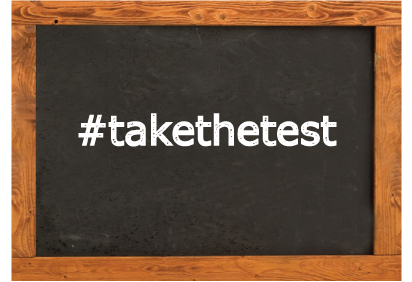It’s not often that I wake up in the morning, read the blogs, and find a whole lot of common ground with Valerie Strauss’s “Answer Sheet” in the Washington Post. On days when she is quoting the New York Times’ Michael Winerip, it’s even less likely.
So, in the holiday spirit of cheer and peacemaking, I’m delighted that just before the year runs out, the moment has arrived, in the form of an edgy and yet curiously delightful trend on Twitter.

The trend is in the form of a hashtag (for those who aren’t fully twitterate, that’s a label for a conversation topic, preceded by a #) called #takethetest. In short, it urges policymakers and other folks in positions of leadership in education who support test-based accountability, to take tests themselves. The trend was called out in a post yesterday on the New York Times’ SchoolBook blog, which in turn traces its roots to “a [Dec. 5] post on The Washington Post’s Answer Sheet blog that told the story of a school board member who took his state’s standardized math and reading tests for 10th graders.”
The posts cap a year of complicated and contentious conversation about the role of test-based accountability in education. The conversation starts from a place of reasonable agreement—that it’s important for parents, schools, and school systems to know whether kids are learning what’s most important. And at least in theory, accountability is a concept that this country loves.
But the conversation quickly becomes more complicated when we talk about specific tools. Mostly, it revolves around standardized tests—an instrument that may be vitally necessary, but is darned hard to love. Over the past year, much of the drama has surrounded the brilliant, controversial LA Times series on value-added assessment, and a handful of cheating scandals attached to high-stakes standardized tests. An increasing backlash against such tests has motivated a small but incredibly vocal movement, which culminated in this virally circulated standoff between a movie star and a cub reporter on an overheated Washington day. Never in my memory have we seen more passion attach itself to the once-nerdy topic of educational assessment. And it’s not going away; as Jay Mathews pointed out this week, there’s not much light between the serious presidential contenders on test-based accountability.
Yet for all the passion, disappointingly little of the public conversation has been about better, smarter ways to figure out whether kids are learning what’s most important. I don’t know anybody who thinks that reading and math skills are enough to get you through college, but are we any good at figuring out what kids know in other areas, from critical thinking to working collaboratively to writing? The SAT remains the best widely used indicator of kids’ readiness for college, but as Andy Rotherham noted this week, that’s a troubled marriage at best. Meanwhile, a well-funded effort by the Obama administration to improve assessment has been little part of the national conversation. And a really terrific tool to assess writing and critical thinking skills, developed by RAND and a better predictor of college success than the SAT, remains practically secret.
That’s why I love #takethetest so much—because it’ll get us talking about the actual tools more, and the politics less. In fact, there’s a movement building inside my office for all of us at NewSchools to take the standardized tests that are used to track student progress in the schools and other entrepreneurial organizations that we support. This could actually be fun. For a minute or two.
No one doubts that we need to know, as a former president said, whether our kids is learning. Here’s to 2012 being a year of more light and less heat.

